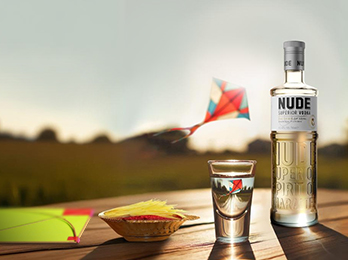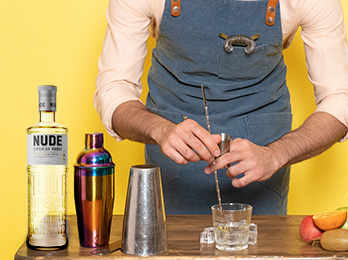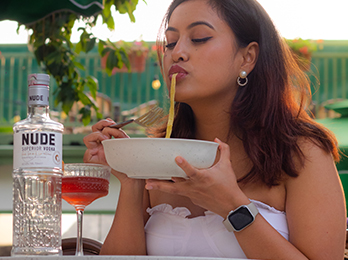Vodka, whether it’s a staple in your home bar or your go-to at parties, carries with it a reputation that's a mix of truth and myth. Over the years, this versatile spirit has sparked countless misconceptions.
Let’s clear the air and get to the heart of what’s real and what’s just a tall tale. Whether you’re a casual sipper or a vodka aficionado, these insights will deepen your appreciation for this iconic drink.
The Origins of Vodka: A Quick Journey Through History
Before we start busting myths, it’s worth taking a quick detour through vodka’s rich history. Did you know that this beloved spirit hails from Eastern Europe, particularly Russia and Poland?
The word "vodka" actually comes from the Slavic term "voda," meaning water. It wasn’t always just for cocktails, though. Back in the day, vodka was used medicinally before evolving into the smooth, clean-tasting spirit we know today.
Myth 1: Vodka is Completely Flavorless:
Let’s tackle one of the biggest misconceptions: the idea that vodka is flavorless. Sure, vodka is often called "neutral," but that doesn’t mean it’s tasteless.
If you’ve ever taken the time to really savor a good vodka, you might’ve noticed subtle hints—maybe a creamy texture, a whisper of fruitiness, or something else that gives it character. This myth probably comes from comparing vodka to more intense spirits like whiskey or rum, but trust me, there’s more going on in that glass than you might think.
The Truth:
✔︎ Vodka does have subtle flavors, influenced by the ingredients and distillation process.
✔︎ Premium vodkas often have more nuanced taste profiles.
✔︎ "Neutral" refers to vodka’s versatility in mixing, not a lack of flavor.
Myth 2: All vodka is calorie-free:
If you’re watching your calories, you might have heard that vodka is a guilt-free option. While it’s true that vodka is lower in calories compared to some other drinks, it’s not completely free of them.
The Facts:
✔︎ A standard 1.5-ounce shot of vodka has about 96 calories.
✔︎ Vodka doesn’t have carbs, which helps keep the calorie count lower than some other spirits.
✔︎ Be careful with mixers—they can easily turn a light drink into a high-calorie one.
Myth 3: Vodka Has No Smell:
Another myth to clear up is the idea that vodka is odorless. While its smell might be subtle compared to other spirits, if you take a good sniff, you’ll notice it’s definitely there.
What You Should Know:
✔︎ Quality vodkas have a clean, subtle smell.
✔︎ The scent can vary depending on what the vodka is made from—grain, potato, fruits, etc.
✔︎ Some vodkas carry hints of citrus, vanilla, or even a slight medicinal smell.
Myth 4: All Vodkas are Gluten-Free:
With gluten being a buzzword lately, it’s important to address the assumption that all vodkas are gluten-free. The truth is, most vodkas are, but it’s not an absolute rule.
The Reality:
✔︎ Most vodkas, even those made from wheat, are gluten-free thanks to the distillation process.
✔︎ Some vodkas might still have trace amounts of gluten.
✔︎ If you have celiac disease or severe gluten sensitivity, it’s best to stick to vodkas that are labeled as gluten-free.
Myth 5: Freezing vodka improves its quality:
Many of us store our vodka in the freezer, thinking it makes it better. However, that frosty treatment can actually dull some of the vodka’s best qualities.
What Really Happens:
✔︎ Freezing vodka can mute its subtle flavors and aromas.
✔︎ It’s often better to chill vodka in the fridge or serve it over ice.
✔︎ The best serving temperature depends on the specific vodka and your personal taste.
Myth 6: Vodka Improves with Age:
Unlike fine wines or certain whiskey, vodka doesn’t get better with age once it’s in the bottle.
The Truth About Vodka Aging:
✔︎ Vodka is at its peak when fresh.
✔︎ Long-term storage won’t enhance vodka’s taste or quality.
✔︎ Proper storage can maintain vodka’s quality, but it won’t improve it.
Also Read: 10 Popular Vodka Cocktails You Must Try This Summer
Conclusion: Sipping vodka with clarity
By knowing these vodka myths, we hope you’ll gain a new level of appreciation for this classic spirit. Whether you’re mixing it into your favorite cocktail or sipping it neat, knowing the real deal about vodka can make the experience that much more enjoyable. And remember, as with all things, moderation is key to fully enjoying vodka or any other alcoholic drink.
Next time you pour yourself a glass or order a vodka-based cocktail, you’ll do so with a bit more knowledge—and who knows, maybe even impress your friends with some myth-expose these facts!






